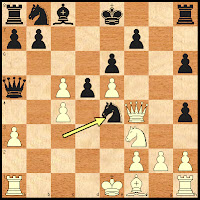RVCCA Championship Game
Arcadia Books and Café, Spring Green, WI.
August 17th, 2011
Time Control: G/60 +5
[English opening (A13) |>| Nimzo-Indian: Leningrad Variation (E30)]
1.c4
English opening (A13)
1…e6 2.Nc3 Nf6 3.d4 d5
What started out as an English Opening transposed into a Queen's Gambit Declined.
4.Bg5 h6 5.Bh4
Possibly better was Bxf6. If Black recaptured with his queen, White could win the d-pawn; if Black recaptured with the g-pawn, then he'd have doubled pawns (although this may not be too bad for Black, especially if he were to castle queenside vs White castling kingside).
5…Bb4
Transposes into a variation of E30: Nimzo-Indian: Leningrad Variation
6.Qd2
e3 protecting the c-pawn is stronger; White would be OK trading his knight for bishop, even though doubling his pawns.
6…c5=/+ 7.e4?
[Better is: 7.e3=/+ and White could well hope to play on]
Loses a pawn...
Loses a pawn...
7...g5-+ 8.e5??
[shortens the misery for White]
[Better is: 8.exd5 gxh4 9.a3 cxd4 10.Qxd4 Bxc3+ 11.Qxc3 exd5 12.Nf3-+ ]
Now loses a piece...
Now loses a piece...
8...Ne4
[8...gxh4?! is clearly worse 9.exf6 cxd4 10.Qxd4-+ ]
9.Qf4
9.Qf4
[9.Qc2 does not save the day 9...Qa5 10.0-0-0 Bxc3-+ (10...gxh4?! is no comparison 11.Nxe4 dxe4 12.a3 Bxa3 13.bxa3-+ ) ]
Allows trading of queens & loss of a pawn (or 2?), in addition to losing a piece.
White resigns to the fact that the bishop is gone and tries for a startling move and damage control.
9...gxh4
[Better is: 9...Nxc3 and Black can celebrate victory 10.a3 Ba5 (10...gxf4?! is easily refuted 11.Bxd8 Nc6 12.axb4 Nxb4 13.bxc3 Nc2+ 14.Kd1 Nxa1 15.Bf6-/+ ; 10...gxh4?! is a bad alternative 11.axb4 Ne4 12.f3-+) 11.bxc3 Bxc3+ 12.Ke2 Bxa1-+ ]
10.a3 Bxc3+
[10...Ba5!? makes it even easier for Black 11.b4 cxb4 12.Nxe4 dxe4 13.Qxe4 bxa3+ 14.Kd1-+ ]
11.bxc3 Nxc3
11.bxc3 Nxc3
[11...Qa5 and Black can already relax 12.Ne2 cxd4 13.cxd5 exd5 14.f3-+ ]
12.dxc5 Qa5 13.Nf3
12.dxc5 Qa5 13.Nf3
[13.Qd2 doesn't change the outcome of the game 13...d4-+ ]
13...Ne4+
13...Ne4+
If Black wanted to attack White's king, he'd be better off developing his queenside pieces prior to embarking on checks that are easily parried.
14.Nd2 Qc3
[Better is: 14...Nc6 might be the shorter path 15.Rd1 Nc3 16.cxd5 exd5-+ ]
The previous check would have made more sense if Black intended to trade queens & knights (which he could enforce and would be a good idea, since he's ahead a piece).
The previous check would have made more sense if Black intended to trade queens & knights (which he could enforce and would be a good idea, since he's ahead a piece).
15.Ra2
[15.Rd1-+ otherwise it's curtains at once]
This move loses the rook via Qc1+ 16. Ke2 Nd3+ forking king & rook. Better was Rd1, protecting the knight and keeping Black from trading off pieces.
This move loses the rook via Qc1+ 16. Ke2 Nd3+ forking king & rook. Better was Rd1, protecting the knight and keeping Black from trading off pieces.
15...Nxc5
[Better is: 15...Qc1+ keeps an even firmer grip 16.Ke2 Nc3+ 17.Kf3 Qd1+ 18.Ke3 Nc6-+ ]
Black missed the tactic & settled for grabbing a pawn. He still had a winning position though.
Black missed the tactic & settled for grabbing a pawn. He still had a winning position though.
16.Be2
[16.Qf3 cannot change what is in store for ? 16...Qxe5+ 17.Qe3 Qxe3+ 18.fxe3 b6 19.cxd5 exd5-+ ]
This move loses the queen via Qc1+ 17. Bd1 Nd3+ forking king & queen.
This move loses the queen via Qc1+ 17. Bd1 Nd3+ forking king & queen.
16...Nd3+
[Better is: 16...Qc1+ makes sure everything is clear 17.Bd1 Nd3+ 18.Ke2 Nxf4+ 19.Ke1 Nc6-+ ]
Black again missed a knight fork, but trading pieces retained his winning edge.
Black again missed a knight fork, but trading pieces retained his winning edge.
17.Bxd3 Qxd3
[17...Qc1+ makes it even easier for Black 18.Ke2 Qxh1 19.Rc2-+ ]
18.Qg4
18.Qg4
[18.cxd5 does not improve anything 18...exd5 19.Qxh4 Rg8 20.Qxh6 Nc6-+ ]
18...dxc4
18...dxc4
[Better is: 18...Nc6-+ seems even better]
19.Qg7
19.Qg7
[19.Qxc4 what else? 19...Qxc4 20.Nxc4-+ ]
19...Rf8 20.Qxh6 c3 21.Qg5
19...Rf8 20.Qxh6 c3 21.Qg5
[21.Qxh4 is no salvation 21...Nc6 22.Qg3 cxd2+ 23.Rxd2 Qe4+ 24.Kf1 Qb1+ 25.Ke2 Qb5+ 26.Qd3 Qxe5+ 27.Qe3 Qh5+ 28.Qf3 Qh4-+ ]
White sets a desperation trap...
White sets a desperation trap...
21...cxd2+
Black's greed loses his queen, since Rxd2 pins the queen to d8, a checkmate square.
22.Rxd2 Qc3???
[Better is: 22...Qe4+ and Black has prevailed 23.Qe3 Qxg2-+ ]
Loses instantly. Black would still have been in the game with a +2 material advantage if he had traded queen for rook, instead of moving the queen out of the way.
23.Qd8#
Loses instantly. Black would still have been in the game with a +2 material advantage if he had traded queen for rook, instead of moving the queen out of the way.
23.Qd8#
White Mates
1-0
Black outplayed White for most of the game, but committed a few vital sins (notably leaving his king exposed and not developing his queenside pieces) & then made a couple of major blunders that allowed White to swindle the win.
[Analysis by tChess and Deep Rybka 4.1 ]
Annotation by Taylor Scott and Mike Rohe










No comments:
Post a Comment